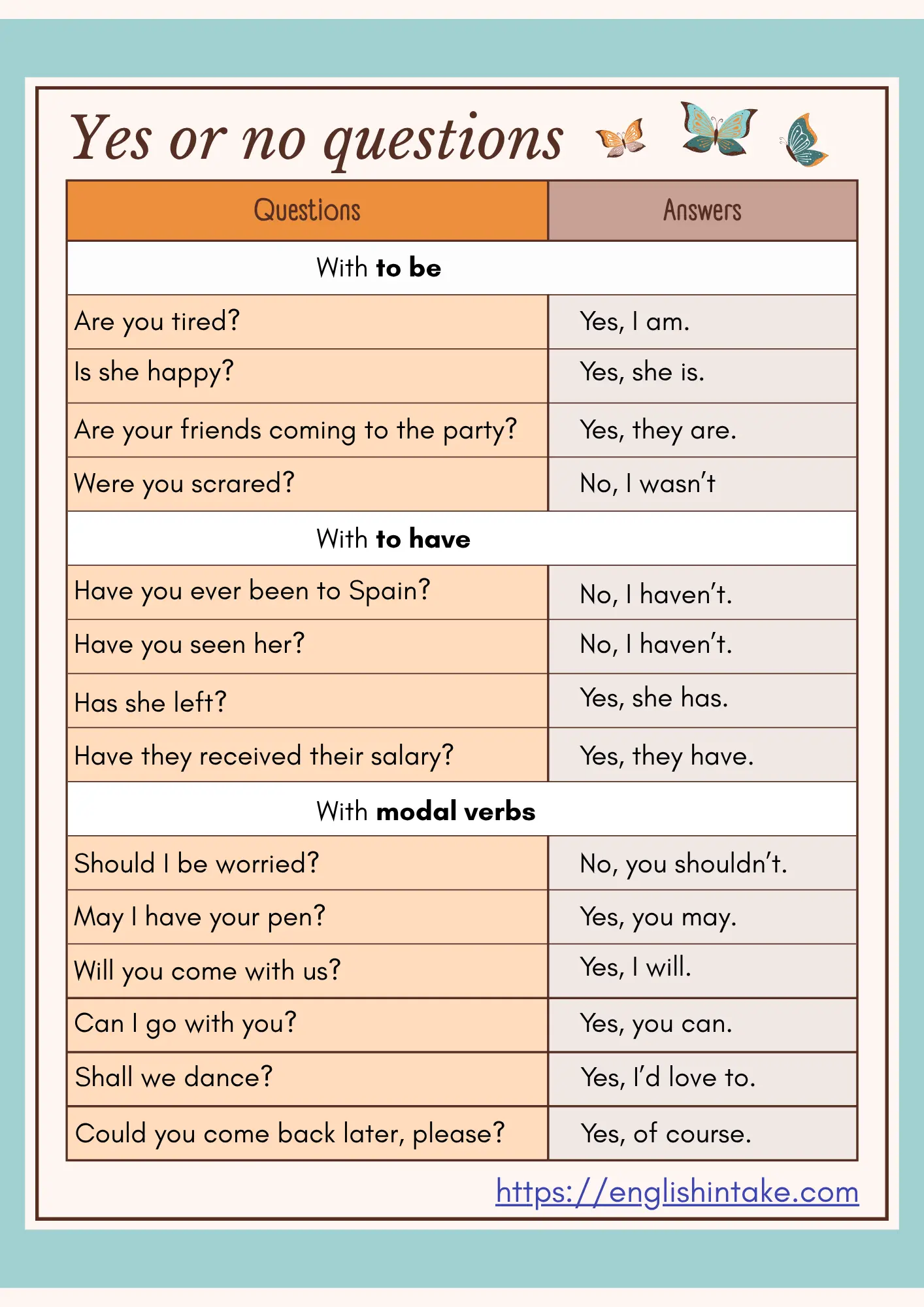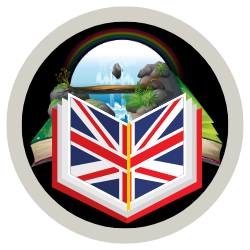1. Yes or no questions with different auxiliaries

1.1 Verb to be
To form yes or no questions with the verb "to be," we invert the subject and the verb. This structure is used for asking questions about a subject’s identity, condition, or characteristics.
| Questions | Answers |
|---|---|
| Are you a teacher? | Yes, I am. |
| Is she at home? | No, she isn’t. |
| Are they ready for the exam? | Yes, they are. |
| Is it raining? | No, it isn’t. |
| Are we late? | Yes, we are. |
| Is this your book? | No, it isn’t. |
| Are you happy with the results? | Yes, I am. |
| Is the shop open? | No, it isn’t. |
| Are the kids playing outside? | Yes, they are. |
| Is John coming to the party? | No, he isn’t. |
For sentences starting with "there is" or "there are," simply invert them to form yes or no questions, e.g., "Is there a problem?" or "Are there any cookies left?" The answers are typically "Yes, there is/are" or "No, there isn’t/aren't." These questions usually inquire about the existence of something.
1.2. To have
When using the verb "to have" to form yes or no questions, the structure depends on the tense. In the present simple, we often need an auxiliary verb like "do" or "does," but for present perfect, "have" or "has" takes the role of the auxiliary verb.
| Questions | Answers |
|---|---|
| Have you finished your homework? | Yes, I have. |
| Do you have a pen? | No, I don’t. |
| Has she been to Paris before? | Yes, she has. |
| Does he have a car? | No, he doesn’t. |
| Have they seen the movie? | No, they haven’t. |
| Do we have enough time? | Yes, we do. |
| Has it stopped raining? | No, it hasn’t. |
| Do you have any questions? | Yes, I do. |
| Have you ever been to New York? | No, I haven’t. |
| Does she have any siblings? | Yes, she does. |
1.3. Modal verbs
Modal verbs like "can," "will," "should," "must," etc., are used to ask about possibility, permission, obligation, or ability. These questions do not require auxiliary verbs and follow the simple structure of modal + subject + main verb.
| Questions | Answers |
|---|---|
| Can you swim? | Yes, I can. |
| Should I turn it off? | No, you shouldn’t. |
| Will they come tomorrow? | Yes, they will. |
| Must I finish this today? | No, you mustn’t. |
| You could have helped him, couldn’t you? | Yes, I could. |
| Shall we take the lift? | Yes, we shall. |
| May I sit here? | Yes, you may. |
| Would you like some coffee? | Yes, please. |
| Can dogs fly? | No, they can’t. |
| Should I break up with him? | Yes, you should. |
1.4. Do and does
In the present simple tense, yes or no questions usually use the auxiliary verb "do" or "does" depending on the subject. This structure is common when asking about habitual actions or facts.
| Questions | Answers |
|---|---|
| Do you play the guitar? | Yes, I do. |
| Does she live in London? | No, she doesn’t. |
| Do they go to school every day? | Yes, they do. |
| Does he like ice cream? | No, he doesn’t. |
| Do you drink coffee? | Yes, I do. |
| Does it rain here often? | No, it doesn’t. |
| Do we have a meeting today? | Yes, we do. |
| Do they speak English? | Yes, they do. |
| Does she visit her parents often? | No, she doesn’t. |
| Do you like reading? | Yes, I do. |
1.5. Yes or no questions in the past simple tense
To form yes or no questions in the past simple, we use the past tense of the auxiliary verb "do." This applies to all subjects and verb forms, making it simple to structure these questions.
| Questions | Answers |
|---|---|
| Did you go to the party? | Yes, I did. |
| Did she finish her homework? | No, she didn’t. |
| Did they visit the museum? | Yes, they did. |
| Did it bite you? | No, it didn’t. |
| Did we pass the exam? | Yes, we did. |
| Did you talk to her? | Yes, I did |
| Did he call you last night? | Yes, he did. |
| Did they write you an e-mail? | No, they didn’t. |
| Did you like the food? | Yes, I did. |
| Did she answer your message? | No, she didn’t. |
6. Negative yes or no questions
Negative yes or no questions are questions that include a negative form. They are usually constructed with contractions like isn't, aren't, haven't, or didn't. They often express surprise, expectation, or confirmation of something. For example, "Aren't you coming to the party?" suggests that the speaker expect the person to attend the party. These types of questions invite answers that confirm or deny the assumption behind the question. They are also used to show politeness or suggest that the speaker expects agreement. Responses can be either positive or negative, such as "Yes, I am" or "No, I’m not."
| Questions | answers |
|---|---|
| Isn’t it raining? | Yes, it is. / No, it isn’t. |
| Don’t you like pizza? | Yes, I do. / No, I don’t. |
| Haven’t they arrived yet? | Yes, they have. / No, they haven’t. |
| Didn’t he call you? | Yes, he did. / No, he didn’t. |
| Aren’t we supposed to meet at 7? | Yes, we are. / No, we aren’t. |
| Isn’t she a teacher? | Yes, she is. / No, she isn’t. |
| Didn’t they call you? | Yes, they did. / No, they didn’t. |
| Don’t you have any money? | Yes, I do. / No, I don’t. |
| Isn’t this the right way? | Yes, it is. / No, it isn’t. |
| Aren’t you tired? | Yes, I am. / No, I’m not. |
7. Expanding yes or no answers with additional information
In this lesson, we have learned different forms of yes or no questions. Note that we can give more than just a yes or no answer. Sometimes, it is necessary to add more information to clarify or explain things further. For example, instead of just answering "Yes" or "No," we might say, "Yes, it's raining heavily," or "No, I don't like pizza, but I enjoy pasta."

